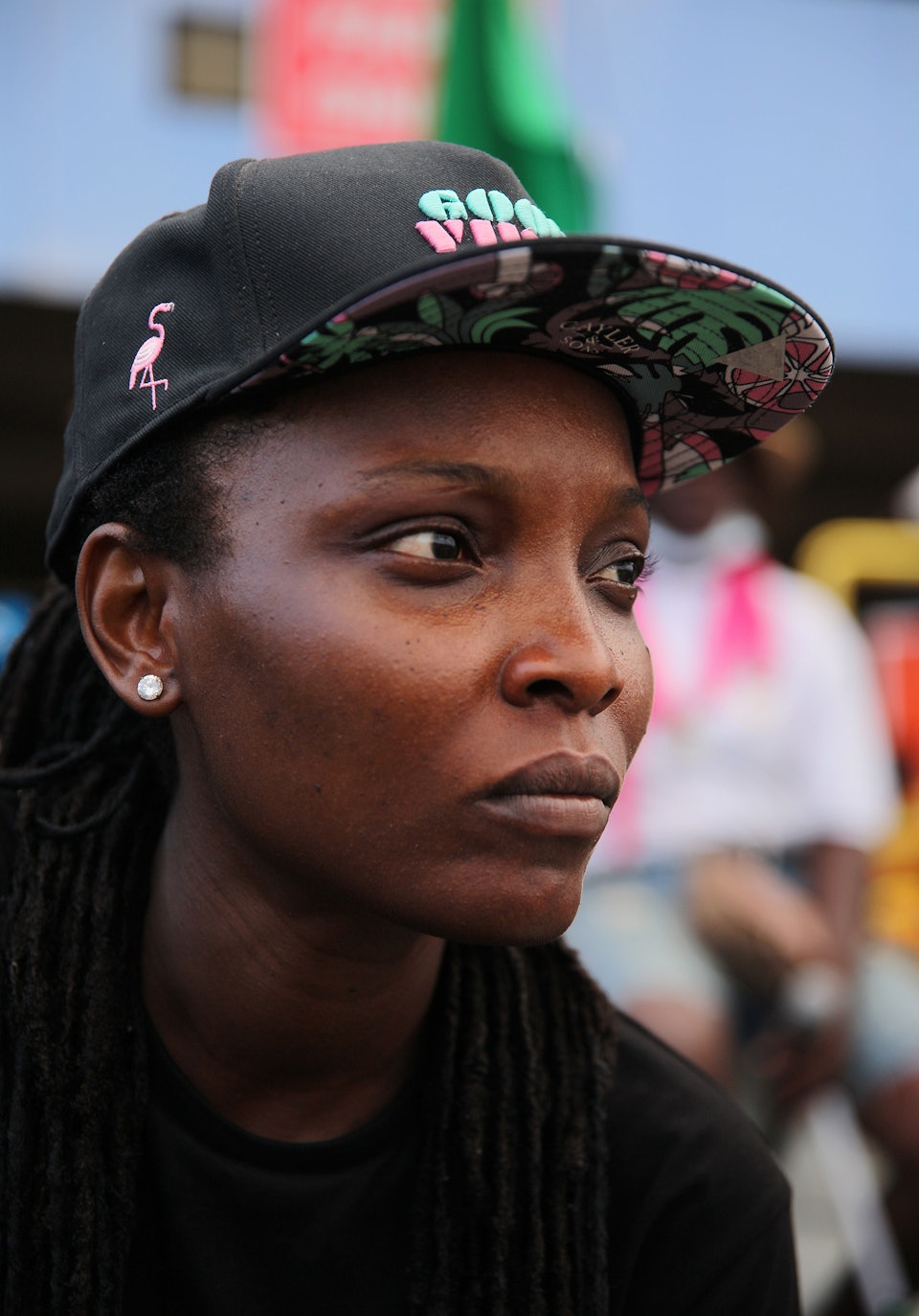Artist Profile
DJ Switch
Nigeria
Current Status: In Exile

For many in Nigeria, Obianuju Catherine Udeh, known professionally as DJ Switch, has come to embody a youth population that knows what it is to fight—and live—for something. In an infallible melodic voice and with a disarming humor, she begins her talk at the 2021 Oslo Freedom Forum by introducing a live video she took in October of 2020. This casual introduction is perhaps purposefully deceptive. On screen, gunshots ring out, a crowd of people can be seen running in collective chaotic movement, and then a panicked yet unfaltering voice is heard clearly, “They’re shooting us!”
DJ Switch, born in Delta State, Nigeria in 1984, is a performing artist, disc jockey, and activist. She won a reality music competition as part of a group in 2009, and went on to win the Glo X Factor in 2013 as a solo act, which landed her a deal with Sony Music. With songs like Don’t Cry for me Nigeria (Parody) and Oluwa (2020), she was well-established as a figure in the contemporary Nigerian music scene when the End SARS demonstrations broke out across the country in late 2020.
End SARS is a social movement protesting against police brutality in Nigeria, specifically calling for the abolition of the Special Anti-Robbery Squad (SARS), a unit of the Nigerian police. SARS was created in 1992 to combat armed robbery in Lagos, but over time expanded throughout the country and developed a reputation for huge abuses of power, engaging in arbitrary arrests, acts of harassment, extortion, rape, and killings. The unit enjoys a high level of impunity, with the Nigerian government responding to allegations of abuse repeatedly in the past with empty promises of reform. The targets of these crimes were most often young people like DJ Switch with “interesting hairstyles, ripped jeans, iPhones, nice cars”. With nearly 70% of Nigeria’s population being below 30 years of age, the movement was naturally spearheaded by young people who were done with living in fear. In a recent interview, Switch says, “#EndSARS is now an identity, the youth’s identity in Nigeria because it is a bold stance against a government that is completely irresponsible and uncaring.”
DJ Switch had lived in Lagos for 7 years prior, and was personally familiar with the crimes that SARS officers all too often committed and got away with. She became one of the most recognizable voices to join the protests. Already well-versed in using her platform to speak out in criticism of the Nigerian government’s lack of transparency and accountability, she even called on her Twitter followers to “stay strong and determined” in the midst of demonstrations. Then, she inadvertently became a key player in a larger fight against the Nigerian government to uphold truth, justice, and democracy.

Switch was part of a group of peaceful protestors who assembled at the Lekki tollgate in Lagos on October 20, 2020. As evening began to set in, the military arrived. Without any warning or attempt at conversation, they opened fire on the gathering. Protestors begin chanting the national anthem in the hope that, as DJ Switch said at Oslo, “they recognized we are not their enemy,” but the onslaught was merciless and continued into a second wave of shooting. Switch instinctively pulled out her phone and began an Instagram livestream as the shooting began and power was cut at the tollgate. It became clear that the attack was premeditated. Amnesty International reported that at least 12 people were killed.
“At that moment, I believed we would all die. I thought, let me put this online, let people see what’s happening, and let them see where we died,” she said of the decision to start the livestream amidst the falling bullets in a 2020 interview with Time Magazine. The video went viral after she managed to escape, one of the only existing crucial pieces of evidence of an atrocity that the Nigerian government fervently denied ever happened. Switch was accused of falsifying the video and labeled a “front for divisive and destructive forces,” receiving threats from the state in the days following. In the time since, a Nigerian judicial panel has found the army culpable in the shooting, labeling it a ‘massacre’.
DJ Switch hasn’t been back home since the day of the attack. Forced to flee Nigeria for her safety, she has given speeches and interviews calling her fellow Nigerians to action and calling for state accountability. She remains active mostly virtually, through social media as well as video appearances. She spoke at the 19th Assembly of States Parties to the International Criminal Court in December 2020 and was awarded a prestigious fellowship from the National Endowment for Democracy in March 2021 focused on developing social media content to engage citizens in advocating for human rights and democracy in Nigeria.
DJ Switch’s music is still important to her, a dream that seems for now to have “just blown up into smoke,” as she said to Time Magazine. She’s focused now on Nigeria’s 2023 elections, determined to help shape a real democracy that is kinder to its people. With over 900,000 Instagram followers, she remains a powerful voice for the youth of Nigeria. She considers herself now, foremost, to be fighting for those who died in the protests, believing firmly, as she told CNN, that “The truth needs no defense.”
By Maya Razvi, March 2022. Maya is a junior at Bennington College studying Visual Arts and Literature.